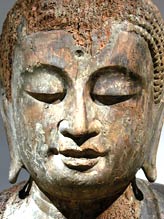Tue, 30 September 2008
The Asvagosha project was set up in India in the early 1990s as a way of developing cultural activities among poor ‘ex-Untouchable’ communities in slums and rural areas. Teams of performers visit the localities and put on performances of sketches and specially composed songs. The shows reflect the concerns that are uppermost in the minds of the people from these communities- issues such as alcoholism, domestic violence, superstition, and child health. The performers bring a level of humour and energy to their performances, ensuring that the messages are conveyed in a straightforward, unpatronising way. For more on the Karuna Trust’s vital work with ‘ex-Untouchable’ Indian Buddhists, see their website. Singers Dhammachari Ratnodaya, Dhammachari Kamalabodhi, Dhammachari Satyadeepa, Dhammachari Yashoratna, Rahul Sownone, Satish Moon Musicians Ananada Panchabhai, tabla Original Producers Dhammachari Siddhartha, Jayant Barve Digital Remastering Dhammachari Candradasa All songs composed by members of the Asvagosha project (except ‘Raho Sukhame’ – composed by Dharmarakshita) The Asvagosha project is run by Karuna Trust and Bahujan Hitay. Both are non-profit charities. Tracked version includes the following detail: 01 Asvagosha, Asvagosha 02 Jivanta Dakhala 03 Ek Bano Neka Bano 04 Dhamma Januna Ghe 05 Tumche Amuche Bandhutwache Nate 06 Andaratun Baher Ya Ho 07 Ata Tumhi Te Deepa Wha 08 Mahaparinirvana Sagari 09 Raho Sukhane Ha Manau Ethe |
Thu, 4 September 2008
Tracked version includes the following detail: 1. Introduction to Chetul Sangye Dorje; Sangharakshita’s first meeting with him 2. Early years and practice; a meeting with the Regent of Tibet 3. The meaning of Chetul Sangye Dorje’s name; a meeting with Thomas Merton 4. A teaching to Paramartha; two mind-training slogans (lohjong); practising for yourself versus practising for others; a quote from Sangharakshita 5. Real practice as love and kindness to others; commentary on mind-training by Jamgon Kontrul; the mantra of the universe; resorting to ‘the magical practice’ of spiritual individualism; going beyond yourself 6. How to practice for others; Green and White Tara; significance of Tara’s leg position; balance between self-focus and other-focus; the conflict of choice 7. Be friendly even when you can’t be happy; green, nature, and remaining open 8. Practising together, in numbers; all beings as White Tara; drawing strength from communal practice 9. Don’t settle for a comfortable life; White Tara as a young girl; settling down; Chetul Sangye Dorje and the meat-eating teacher’s disciple 10. Conclusion – Tara as embodiment of practice for others; not allowing our Buddhism to become self-indulgence |
Sun, 29 June 2008
In the opening remarks (which, unfortunately, were not recorded) he likens these suttas in their profound scope and effect to the simpicity and purity of Bach’s violin sonatas and cello suites. Given on the FWBO International Retreat at Taraloka, May 2008 |
Wed, 26 December 2007
No? Oh, well, what this most definitely is is an absolute cracker of a talk from Sagaramati. A brilliant, scholarly-but-accessible, look at the origins and development of the Tathagatagarbha (Buddha Nature) school of Buddhist thought through the lense of early Buddhist scripture. Many misunderstandings are addressed as Sagaramati (aka. Professor Robert Morrison), with his usual wry, testy humour, takes us back to basics in considering just how – if at all – Tathagatagarbha doctrine is in harmony with Buddhist tradition. And he surprises himself in the process, evoking a path of practice rooted in kindness and a vision of ever-present possibility for all of us. Talk given in 2004. To help us keep this free, please think about making a donation. |
Thu, 1 November 2007
Please note: In this talk Danavira uses and adapts verses from the excellent ‘Self-Liberation Through Seeing With Naked Awareness’ by John Reynolds (Station Hill Press 1989) Talk given at Padmaloka Retreat Centre, 2001 To help us keep this free, please think about making a donation. |
Tue, 4 September 2007
Talk given at the Buddhafield Festival, Devon, 2007 Contents 01 ‘Evolution or extinction’ by Sangharakshita (1971) – this talk as a response; the Buddha’s basic teaching and experience; conceptual constructions of a specific time and culture – ‘pratitya samutpada’ (‘dependent arising’) and ‘general systems theory’ 02 The difference between causality and conditionality; Cartesian thinking – from the holistic to the mechanistic; conditionality through the whole of human culture and experience; properties of all systems; feedback mechanisms; systems evolving in complexity – evolution and change; points of instability – the possibillity of collapse; non-predictability and synergy 03 Repercussions for how we act; the Cartesian model of the world and its effect on behaviour; systems theory, actions and consequences; means and ends as the same thing 04 Social networks, systems and change; ‘event-triggering process’ – shocks to the system and creative response; change with a community of individuals; the properties of a living community 05 What the Mafia can teach us about supporting change; Fritjof Capra’s ideas on the criminal underworld’s success; what the Mafia does well as a community; towards an ethical underworld 06 What we can do individually and collectively; the revolutionary nature of the ‘metta bhavana’ meditation (‘development of loving kindness’); actions and consequences again; taking risks; different ways of doing community; collective change is not comfortable – the validity of strong emotions 07 The importance of passing on knowledge and promoting another vision of the world; diversity; don’t leave your values and principles at home; acting from the heart; the ‘infinite game’; profound personal feedback from your efforts To help us keep this free, please think about making a donation. |
Tue, 24 July 2007
This is another great talk from the ‘Dharma Warriors’ series given at the Buddhafield Festival 2006. Karunagita is the author of ‘Growing as a Parent – What Buddhism Has to Offer’, and here she presents some of that material to an audience of summer loving practitioners under the blue skies of Devon. Settle back and enjoy the sound of drums, kids’ voices, and Karunagita’s perspectives on the challenges and opportunities of raising a child as part of your practice of the Dharma. She encourages us to see and accept the gifts of love, letting go and awareness (of our limitations and of our mortality) that are inherent in the life of any parent – and we catch a hint of the growth and wisdom that are possible for the heart as it opens to meet its experience in the most fundamental relationship of all. Talk given at the Buddhafield Festival, Devon 2006 To help us keep this free, please think about making a donation. |
Mon, 4 June 2007
A short but sweet talk from San Francisco’s very own Suvarnaprabha, in which she explores the Buddhist vision of compassion through her own experience of meditation and contact with inmates within the U.S. prison system. Moving stuff. Talk given at the Western Buddhist Order convention, 2005 Contents 01 Survanaprabha – poem by Jimmy Santiago Baca; a personal interest in violence 02 Violence as resistance in meditation; compassion as not resisting experience 03 Prisoners talking about self-perpetuating violence 04 The vastness of compassion; the difficulty of talking about shunyata and compassion 05 An anecdote about selflessness; quote from Shunryu Suzuki To help us keep this free, please think about making a donation. |
Fri, 27 April 2007
Time for another talk from Vajradarshini. More poetry, more Rumi, more listening joy. Actually, we just liked the title so much we had to go for it this month – but, in fact, it’s another splendid journey around the idea of Enlightenment, using the languages of surrender and discipline from the Sufi context. It’s as heady as a sumptuous wine, but also sobering and down to earth, whether we’re “following a railing in the dark” or walking lost “inside the red world”. Drink up! Talk given at Taraloka Retreat Centre, 2005 Contents 01 Starting with a poem by Rumi – not a ‘sensible’ talk 02 ‘Enlightenment’; following a railing in the dark; wine in Rumi’s poetry; the Dharma as studying the self; surrender and discipline 03 The Tavern – pushing off for Truth; ‘managing’ samsara and settling down 04 Fermentation; being cooked – slowly 05 How we are cups; two ways we limit ourselves – i. literalism; a quote from Aloka – abandoning ideas of what the ‘path’ is 06 Sangharakshita on literalism and craving; effective Going for Refuge and giving up limited ideas; the antidote to beauty 07 ii. Utilitarianism; Sangharakshita’s idea of the Greater Mandala of Uselessness; literal takes on aesthetics; breaking the cups 08 Pushing off into truth; kinds of connection with Buddhas and Bodhisattvas; Reality and form and emptiness; visualistaion practice and life – things arising and disolving 09 ‘Fana’ and ‘baka’ in Rumi’s poetry – two streamings across the doorsill; Shams-e-Tabrizi – Rumi’s teacher 10 The importance of reflecting on form and emptiness; the eight-point mind training – taking all obstacles with you on the path; the Bodhisattva Ideal from the perspective of emptiness; spiritual practice in a world neither real nor illusory 11 Pema Chodron on how to avoid burn-out; shunyata and unrealistic ideals; a quote by Dennis Potter near to death; the trivial and the important; birdsong 12 Hsuan-Tsang’s ‘trusting mind’; introducing the dirt we buy to the dirt we already have To help us keep this free, please think about making a donation. |
Tue, 27 February 2007
Here is the second part of Paramabandhu’s excellent exploration of the lessons Buddhist techniques around meditation and mindfulness training can bring to the field of mental health – especially to problems with depression and addiction. Drawing on many years of experience as a consultant psychiatrist and Dharma teacher, here he takes questions on his previous talk and elaborates on the general theme. There’s a wide range of material opened up – and considerable detail about how we can actually go about applying these techniques to whatever challenges we face in your own lives. Essential listening. Please note – the questions in this recording were made at very low levels. We’ve amplified and clarified where possible – but the general sound quality drops noticeably at these points. However, they are all now audible and, in almost all instances, questions are repeated by Paramabandhu before he answers. Talk given at San Francisco Buddhist Center, 2006 Contents 01 Question-and-answer session – two books to reference on mindfulness; working with depression – discrepancy monitor and rumination 02 Knowing what you can and cannot change – considered action 03 Difficulty doing mindfulness work when actively depressed; noticing subtle shades of pleasant and unpleasant 04 Can mindfulness initiate depression? Stepping out of patterns of thinking; difference between rumination and ‘staying with’; body awareness 05 Over-active mind; 12 step program – something to actually do; expectations and suffering; having your experience – the truth as sometimes uncomfortable 06 Letting go of what you don’t have; relationship break-up; staying with unpleasant experience and not compounding it – the Buddha in the ‘Dart Sutta’ 07 Not identifying with one feeling; sexual addiction; recovery from addiction and mindfulness practice 08 Rumination in the body; working with internal sensations; using metaphors to work with your mind 09 Psoriasis and mindfulness 10 What is meditation? A brief introduction and exercise – the ‘Three Minute Breathing Space’ To help us keep this free, please think about making a donation. |
Fri, 23 February 2007
This is a timely and invaluable talk from Paramabandhu. Drawing on many years of experience as a consultant psychiatrist and Dharma teacher, he invites us to consider the lessons Buddhist techniques around meditation and mindfulness training can bring to the field of mental health – especially to problems with depression and addiction. The talk evokes the Buddha in the Satipatthana Sutta to explore the four traditional foundations of mindfulness and discuss their potential use in therapeutic contexts. It is a kindly and empowering expression of practical hope, whose message applies to us all as we struggle to overcome whatever it is that holds us back from greater freedom in our lives. Part 2 of this podcast will feature a question-and-answer session based on the material Talk given at the San Francisco Buddhist Center, 2006 Contents: 01 Contemporary interest in mindfulness; brief therapeutic history of meditation since the 1960s; the Buddha as behavioural therapist – the obese king, Kisa Gotami and her baby 02 John Kabat-Zinn and mindfulness-based stress reduction; other therapies based around mindfulness 03 Mindfulness in Buddhist tradition; the Satipatthana Sutta; sati and sampajanya; analogies for mindfulness; the four foundations of mindfulness – an analysis of technique in practice 04 Four aspects of mindfulness in therapeutic context; i clocking what’s going on – being on automatic pilot 05 ii Sitting with your experience; Rumi’s poem ‘The Guest House’; the kindly aspect of awareness; body awareness and mental proliferation 06 iii Perspective; cognitive behavioural therapy and mindfulness-based cognitive therapy – the implicit and the explicit; not taking our thoughts so seriously; iv choice – mindfulness of purpose 07 Taking awareness deeper; freedom; Kotita’s ‘Song of Realization’ To help us keep this free, please think about making a donation. |
Free Buddhist Audio (Free Buddhist Audio)

Categories
DharmabytesFree Buddhist Audio
Podcasts
Buddhism
FBA Podcast
Archives
AprilMarch
February
January
December
November
October
September
August
July
June
May
April
March
February
January
December
November
October
September
August
July
June
May
April
March
February
January
December
November
October
September
August
July
June
May
April
March
February
January
December
November
October
September
August
July
June
May
April
March
February
January
December
November
October
September
August
July
June
May
April
March
February
January
December
November
June
May
April
March
February
January
December
August
June
April
February
January
December
October
July
June
May
April
March
February
January
December
November
October
September
August
July
June
May
April
March
February
January
December
November
October
September
August
July
June
May
April
March
February
January
December
November
October
September
August
July
June
May
April
March
February
January
December
November
October
September
August
July
June
May
April
March
February
January
December
November
October
September
August
July
June
May
April
March
February
January
December
November
October
September
August
June
May
September
May
January
September
June
May
January
December
November
September
July
June
April
February
January
December
November
October
September
July
May
April
March
February
January
November
September
August
July
| S | M | T | W | T | F | S |
|---|---|---|---|---|---|---|
| 1 | 2 | 3 | 4 | 5 | 6 | |
| 7 | 8 | 9 | 10 | 11 | 12 | 13 |
| 14 | 15 | 16 | 17 | 18 | 19 | 20 |
| 21 | 22 | 23 | 24 | 25 | 26 | 27 |
| 28 | 29 | 30 | ||||
Syndication







